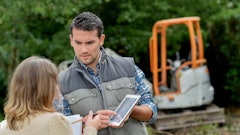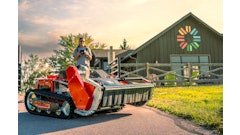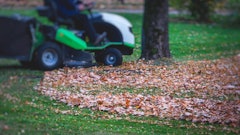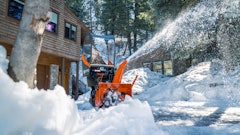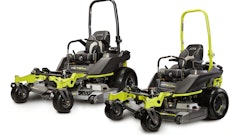
Autumn brings unique challenges and opportunities in landscaping that require specific skills from every team member. After the leaves and tree cleanup in the fall, most landscaping teams may think their work is pretty much done for the season.
There are still so many tasks that remain to be done in autumn. A team with the right training, solid insight into their duties and a few hard-earned secrets of the trade can push fall productivity through the roof. Here are eight key training skills to focus on for your fall landscaping projects.
1. Leaf management techniques
The golden and rust-colored autumn leaves may be pretty to look at. But that's pretty much where their charm ends. Train your team on:
- Proper raking methods to avoid strain and injury to themselves and damage to the lawn
- Effective use of leaf blowers, including noise-reduction techniques
- Composting basics to turn leaves into valuable mulch
- Strategies for managing wet, heavy leaves
It may sound trivial, but knowing how to handle leaves efficiently can save time and effort, keeping your team productive and the clients satisfied.
The EPA estimated that the generation of yard trimmings in MSW was 35.4 million tons in 2018. From these, only 63% were composted or mulched, leaving a large proportion of waste that your team can help reduce with the appropriate training.
2. Plant protection and winterization
Most plants need protection or insulation during the colder months. This is even more relevant for newly planted seedlings or delicate plant species vulnerable to frost. Train your team to:
- Identify sensitive plants
- Learn techniques for protecting different plants (wrapping, mulching, covering)
- Develop timelines for plant winterization
- Apply antidesiccant sprays to evergreens
- Drain and winterize irrigation systems
Winter is tough on landscapes, and the right steps now will make a big difference come spring. A well-trained team will know exactly how to protect tender plants and ensure minimal damage, making for happier clients and a less hectic spring season.
3. Fall planting best practices
It's cold out. No one denies it, but that doesn't mean planting stops dead in its tracks. In fact, fall brings an enormously beneficial planting season for many plants like bulbs and perennials. These can be planted now; they'll already have their roots down when spring arrives. For your team, this means knowing:
- Ideal planting windows for trees, shrubs and bulbs
- Proper planting depth and spacing
- Soil amendment and fertilization needs
- Watering requirements for new plantings
For a proper establishment, your team needs to be diligent about planting techniques. Whether it’s bulbs that will bloom in spring or trees that need time to root themselves, the care taken now will show results in seasons to come.
4. Lawn renovation and overseeding
Most state extension services recommend fall as the best time for lawn repair and overseeding. The moderate temperatures, mild weather and better moisture retention create an ideal environment for grass seed germination. Your team needs training in:
- Soil testing and pH adjustment
- Proper aeration techniques
- Overseeding methods for various grass types
- Fertilizer application rates and timing
These landscaping projects can increase the value of your clients' home by simply making the lawn look stunning. Landscapes can contribute from 10% to 30% to a home’s overall value.
5. Fall pruning techniques
A trim here or there is the difference between a healthy, thriving plant and one heading to that big compost heap in the sky. Fall pruning can prevent damage during winter storms and also promote healthy growth in spring. A few things your team should know about fall pruning:
- Which plants benefit from fall pruning
- Proper pruning cuts to encourage branching
- How to identify and remove dead or diseased limbs
- Tools and safety gear for pruning work
In case the team forgets, remind them that it's better to leave a plant unpruned than risk pruning at the wrong time or in the incorrect manner. Damage caused by improper pruning can take years to remedy.
6. Hardscaping and construction skills
Spring and summer aren't the sole seasons for building patios, walkways or retaining walls. In fact, autumn can be a really good time to tackle hardscaping projects, providing you've got the right weather conditions. That's where having a team with proper hardscaping skills can be a great asset:
- Understanding various materials (stone, brick, concrete)
- Paver and stone installation techniques
- Retaining wall construction
- Outdoor lighting setup
- Basic carpentry for decks and fences
- Proper patio slope for optimal drainage
Making sure your team knows their way around hardscaping projects can be the extra touch that takes a home from "good" to "excellent."
7. Equipment maintenance and winterization
How do you keep equipment from breaking down mid-project or avoid starting spring with a bunch of repairs? A sharp, well-trained team will know. Train your crew on how to execute basic maintenance tasks and properly winterize equipment for cold-season storage. Skills such as these can include:
- Clean and sharpen cutting tools
- Winterize power equipment like mowers and trimmers
- Properly store electrical components
- Conduct end-of-season maintenance checks
For a landscaping company, the equipment is a big investment, one that needs to be protected. Your team should know how to tackle basic issues, including changing the oil, spark plug replacement, blade sharpening and fuel treatment, to keep everything running smoothly, saving you time and money in the long run.
8. Customer service and communication
Even the best technical skills won't matter if your team can't interact well with clients. When was the last time they had formal training in customer service and communication skills? A professionally trained team should know how to:
- Professionally respond to client complaints or concerns
- Communicate progress updates on ongoing projects
- Discuss additional services or upselling without coming off as pushy
- Respect client properties by leaving them cleaner than when they arrived
There aren't any shortcuts here. Good work may get you in the door, but good customer service will keep it open.
Your team is the heart of your business. Each person on the team has a job to do, and everyone contributes to making each project successful. Their skills, abilities and how they approach their work directly affect how clients see your business.
Invest in continuous training and create a culture of respect, accountability and enjoyment for the work they do. The rewards won’t just be seen in the team’s growth, competence and increased productivity. They will also show in the satisfied faces of your clients and glowing testimonials, word-of-mouth referrals and optimal ratings on social media platforms.

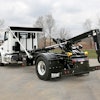
![Gravely Pro Turn Mach One My23 Dsc03139 Edit 1200x800 5b2df79[1]](https://img.greenindustrypros.com/mindful/acbm/workspaces/default/uploads/2025/10/gravely-pro-turn-mach-one-my23-dsc03139-edit-1200x800-5b2df791.BucBnDoN22.jpg?auto=format%2Ccompress&fit=crop&h=100&q=70&w=100)





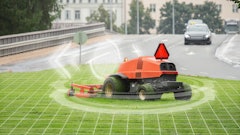

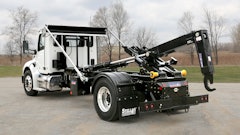
![Gravely Pro Turn Mach One My23 Dsc03139 Edit 1200x800 5b2df79[1]](https://img.greenindustrypros.com/mindful/acbm/workspaces/default/uploads/2025/10/gravely-pro-turn-mach-one-my23-dsc03139-edit-1200x800-5b2df791.BucBnDoN22.jpg?ar=16%3A9&auto=format%2Ccompress&fit=crop&h=135&q=70&w=240)
